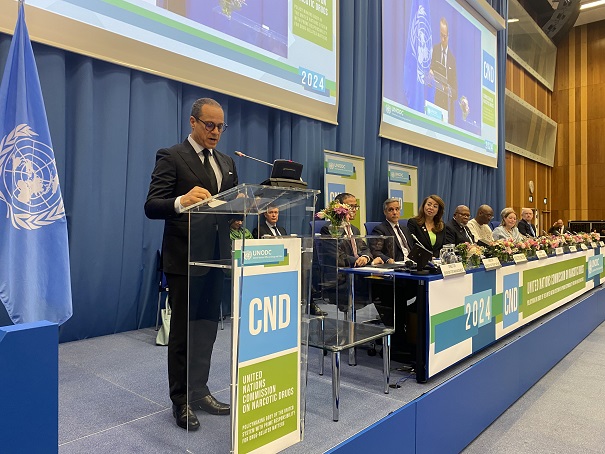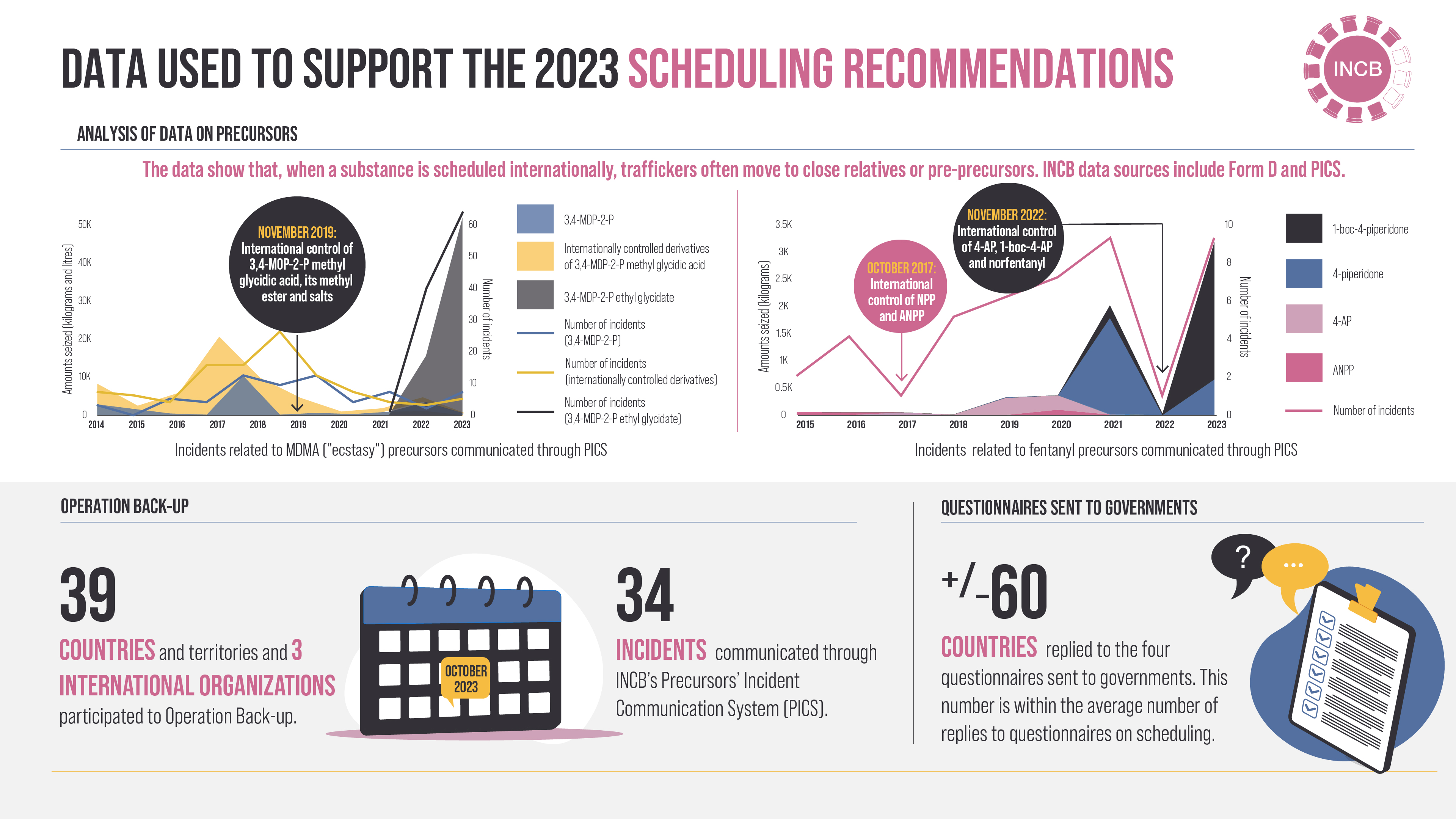International Narcotics Control Board participates in sixty-seventh session of the Commission on Narcotics Drugs, mid-term review process

VIENNA, 21 March - The President and First Vice-President of the International Narcotics Control Board participated in the sixty-seventh session of the Commission on Narcotic Drugs, which took place from 14 to 22 March 2024.
High-level segment: mid-term review of progress made in the implementation of all international drug policy commitments
The sixty-seventh session commenced with a high-level segment to conduct a mid-term review of progress in implementing the 2019 Ministerial Declaration and all other drug policy commitments.
At the opening of the high-level segment on 14 March, the INCB President, Prof. Jallal Toufiq, referred to INCB's contribution to the mid-term review, which maps out a way forward to address the challenges identified in the 2019 Ministerial Declaration, and highlighted support provided to Member States through INCB Learning to address disparities in the availability of internationally controlled substances for licit purposes. The President also presented the tools offered through INCB's precursor control and Global Rapid Interdiction of Dangerous Substances (GRIDS) programmes to support Member States in preventing the diversion of equipment, precursor chemicals, non-scheduled chemicals and trafficking in new psychoactive substances and non-medical synthetic opioids. INCB's contributions to progress on the Sustainable Development Goals were also set out and, in closing, the President pledged INCB's unstinting support on the road to the 2029 review and beyond.
During the General Debate, speakers made pledges to initiate or support projects and programmes that contribute to the implementation of specific commitments related to the challenges, as part of the Chair's "Pledge 4 Action" initiative.
Prof. Toufiq revisited the Board's contribution to the mid-term review in his intervention at the high-level roundtable on The way forward: the road to 2029 on 15 March, mapping out the way forward to promote availability for medical, scientific and industrial purposes and the adoption of health- and evidence-based drug policies that respect human rights. The Board's way forward is based on recommendations made in its Annual Reports and Precursors Reports over the review period of 2019 to 2023.
The President and Vice-President of the Board also participated in a number of side events during the high-level segment on 14 and 15 March. On 14 March, the INCB President addressed the high-level side event on The road to 2029: how to accelerate our efforts to ensure safe access to essential controlled medicines for all patients in need while ensuring rational use and preventing diversion, organized by the Government of Belgium. That afternoon, the President of the Board also took part in the high-level side event, Global call for action: scaling up evidence-based, social and health services to address substance use disorders, organized by the Governments of Italy and Switzerland, at which he stressed the need for countries to protect the rights of people affected by drug use disorders and to ensure access to evidence-based treatment. At a high-level side event on 15 March on Protecting Global Public Health and Safety: Mounting a Unified International Response to Synthetic Drugs and Their Precursors, organized by the Government of the United States, Prof. Toufiq provided an update on support provided through INCB's precursor control and GRIDS programmes.
Also on 15 March, at a high-level side event on Preventing the diversion of non-scheduled chemicals for illicit drug production: addressing a growing challenge to global drug control and governance, organized by the Government of China, INCB First Vice-President Dr. César Arce stressed the need for cooperation in implementing the 1988 Convention, and outlined tools and support provided by the Board. That afternoon, Dr. Arce addressed the question "do the conventions provide the ground of action for Member States and the international community that can be used in guiding interventions to address HIV/AIDS among people who use drugs" at the high-level side event End Inequalities End AIDS - On the Fast-Track: scaling up evidence-based services to address transmission of HIV and viral hepatitis among people who use drugs, organized by the Governments of South Africa and Kenya.
Regular segment
The regular segment of the sixty-seventh session of the Commission took place from 18 to 22 March, during which the INCB President addressed the Commission under agenda item 5 on the implementation of the international drug treaties.
On 18 March, Prof. Toufiq addressed the Commission under Item 5 (b) on challenges and future work of the Commission and the World Health Organization in the review of substances for possible scheduling recommendations, referring to evidence presented in the Board's precursor reports of the continuous emergence of alternatives to controlled precursors, INCB initiatives to support Member States in addressing the diversion of non-scheduled chemicals and designer precursors, and the Board's proposal for the international scheduling of two series of closely related designer precursors of amphetamine-type stimulants.
Also on 18 March, the INCB President presented the Board's 2023 Annual Report and Precursors Report to the Commission under agenda item 5 (c) on the work of the Board. Prof. Toufiq drew attention to the thematic chapter of the annual report on the role of the Internet, including social media, in drug trafficking and use, and encouraged Governments to utilize the INCB real-time counter trafficking tools to help authorities identify traffickers that exploit Internet-related and e-commerce services, as well as work with the INCB GRIDS Programme to facilitate public-private cooperation. The INCB President also highlighted that the Internet and social media also present opportunities, noting that INCB recommends that Governments should develop and conduct drug use prevention campaigns utilizing social media. The President also drew attention to, inter alia, the global issue on challenges and opportunities in promoting drug treatment and rehabilitation according to the UNODC and WHO International Standards for the Treatment of Drug Use Disorders after the COVID-19 pandemic. Further recommendations are contained in the 2023 Annual Report and Precursors Report, available on the INCB web site in all official languages of the United Nations.
The President also addressed the Commission under agenda item 5(d), on international cooperation to ensure the availability of narcotic drugs and psychotropic substances for medical and scientific purposes while preventing their diversion. Referring to the Board's 2022 supplementary report No Patient Left Behind, Prof. Toufiq noted that the persistent regional imbalances in availability of controlled substances not only go against the aims of the drug control conventions to promote the health and welfare of humankind, but also contradict numerous human rights instruments relating to the right to health. Disparities in consumption of morphine and other opioid analgesics, anti-epileptics drugs, and methadone and buprenorphine highlighted the multiple and structural challenges faced by many low- and middle-income countries. The INCB President stressed the need to accelerate efforts to enshrine the goal of ensuring equitable access to and rational use of controlled substances in all national drug control policies and practices and set out the Board's recommendations to this end.
Also under item 5 (d), INCB's 2023 technical publications on narcotic drugs and psychotropic substances were launched.
Decision of the Commission on Narcotics Drugs to follow INCB recommendation to include two fentanyl precursors and 16 precursors of amphetamine-type stimulants in Table I of the 1988 Convention
On 19 March, under agenda item 5 (a), Changes in the scope of control of substances, the INCB President presented the Board's recommendation to place two fentanyl precursors, nine amphetamine/methamphetamine precursors and seven MDMA ("ecstasy") precursors in Table I of the 1988 Convention against Illicit Traffic in Narcotic Drugs and Psychotropic Substances.
Subsequently, the Commission unanimously decided to adopt the Board's recommendations. Pursuant to the 1988 Convention, the decision will become effective 180 days after it is communicated by the Secretary-General to all parties.
All of these chemicals are highly suitable for the illicit manufacture of precursors already listed in Table I of the 1988 Convention. Incidents of illicit manufacture and trafficking involving six of the chemicals have been known, some for many years, yet with increasing frequency and amounts reported since late 2022, as highlighted in the 2023 INCB Precursors Report. For 12 of the chemicals, there have not yet been any known incidents of trafficking to date. International scheduling of these chemicals is expected to prevent instant shifts to them as substitutes. "The 16 amphetamine-type stimulant precursors are all designer precursors with no known legitimate uses and no regular trade," explained the INCB President, referring to CND resolution 65/3, which invited the Board, when communicating its assessment of a substance recommended for placement in Table I or Table II of the Convention, to simultaneously provide the Commission with relevant information about derivatives and related chemicals which may readily be converted to or used in place of that substance during illicit manufacture, as well as recommendations of monitoring measures for these chemicals.
INCB participation at side events during the regular segment and engagement with Member States and civil society
At the side event Taking the Pledge4Action to ensure adequate availability of internationally controlled essential medicines, organized by the International Association for Hospice and Palliative Care with the support of the Government of Belgium and held on 18 March, Dr. Arce drew attention to the challenges to low and middle-income countries as presented in the 2022 INCB Annual Report supplement "No Patient Left Behind", and set out the Board's recommendations, inter alia, to increase the availability of affordable morphine for medical use for these countries, to strengthen national or regional production of generic pharmaceuticals and to consider using methadone and buprenorphine for the treatment of opioid use disorder.
On 19 March, the President of the Board participated in a side event on Harnessing efforts to establish an informal international platform to advocate for drug abuse prevention among young people, organized by the Uganda Youth Development Link in cooperation with the Drug Abuse Prevention Centre of Japan. Prof. Toufiq discussed the role of civil society in implementing the international drug policy commitments and the critical need to prevent drug use, and the initiation of drug use, among young people.
On 20 March, INCB held a side event with the support of the Governments of Mexico and the Netherlands on Challenges and solutions to addressing illicit drug manufacture. Following a presentation by Dr. Arce, present approaches and concrete initiatives to addressing illicit drug manufacture were shared by representatives from four regions and the Chief of the Precursors Control Section of the INCB secretariat, Mr. Antonio Mazzitelli. INCB shared its forthcoming products to address illicit drug manufacture, including a list of derivatives & chemical relatives of controlled precursors and a compendium of domestic drug precursor controls.
Informal consultations were held with Member States on the supply of opiate raw materials and demand for opiates for 2024.
At the margins of the session, the President and First Vice-President of the Board met with representatives of Member States and international and regional organizations as part of ongoing cooperation to promote implementation of the drug control conventions.
On 20 March, the President of the Board held an informal dialogue with the Vienna NGO Committee on Drugs, during which he responded to questions from civil society organizations on topics including availability of controlled substances for medical and scientific purposes, reduction of the negative consequences of drug use, use of digital technologies, human rights, control of cannabis and cannabis-related substances, data collection and missions of the Board. The dialogue was chaired by Ms. Beatrix Vas, Treasurer of the VNGOC, with the participation of Mr. Matej Košir, Chairperson, and VNGOC members. A record number of civil society representatives had participated at the 67 th session of the Commission. Professor Toufiq expressed appreciation for the frank discussion and thanked the civil society representatives for their work to safeguard health and wellbeing.
* * * * *
